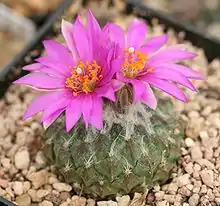| Pelecyphora strobiliformis | |
|---|---|
 | |
| Scientific classification | |
| Kingdom: | Plantae |
| Clade: | Tracheophytes |
| Clade: | Angiosperms |
| Clade: | Eudicots |
| Order: | Caryophyllales |
| Family: | Cactaceae |
| Subfamily: | Cactoideae |
| Genus: | Pelecyphora |
| Species: | P. strobiliformis |
| Binomial name | |
| Pelecyphora strobiliformis | |
| Synonyms | |
| |
Pelecyphora strobiliformis is a species of cactus from Mexico.[3] Its numbers in the wild have been reduced by collecting; it is listed in Appendix I of CITES[3] (meaning that international trade is severely controlled) but only as of "Least Concern" by the IUCN.[4]
Description
Pelecyphora strobiliformis grows with spherical or depressed spherical bodies that are 4 to 6 centimeters in diameter. The warts that lie on the surface overlap each other. They are slightly keeled and the outline is triangular. The warts are 8 to 12 millimeters long and 7 to 12 millimeters wide at their base. The 7 to 12 flexible, whitish, non-persistent spines are arranged somewhat comb-shaped at the tip of the wart and are 5 millimeters long.
The magenta-colored flowers reach a diameter of 1.5 to 3 centimeters. The small fruits are hidden in the hair on the crown. When ripe, they dry out and eventually break down over time.[5]
Distribution
Pelecyphora strobiliformis is widespread in the Mexican states of Nuevo León, Tamaulipas and San Luis Potosí in the Chihuahuan Desert at altitudes below 1600 meters.
Taxonomy
The first description as Ariocarpus strobiliformis was made in 1927 by Erich Werdermann.[6] The specific epithet hintonii honors the Mexican farmer and plant collector George Sebastián Hinton (* 1949), who discovered the species. Alwin Berger described the monotypic genus Encephalocarpus for this species in 1929. Alberto Vojtěch Frič and Ernst Schelle placed them in the genus Pelecyphora in 1935.
References
- ↑ SG), Succulent Plants; SG), Succulent Plants (2009-11-16). "The IUCN Red List of Threatened Species". IUCN Red List of Threatened Species. Retrieved 2023-10-15.
- ↑ "Appendices | CITES". cites.org. Retrieved 2022-01-14.
- 1 2 3 Anderson, Edward F. (2001), The Cactus Family, Pentland, Oregon: Timber Press, ISBN 978-0-88192-498-5, p. 561
- ↑ Fitz Maurice, B. & Fitz Maurice, W.A. (2017), "Pelecyphora strobiliformis", IUCN Red List of Threatened Species, International Union for Conservation of Nature, retrieved 2019-07-24
- ↑ Anderson, Edward F.; Eggli, Urs (2005). Das grosse Kakteen-Lexikon (in German). Stuttgart (Hohenheim): Ulmer. p. 521–522. ISBN 3-8001-4573-1.
- ↑ "Au Cactus Francophone :". Au Cactus Francophone (in French). Retrieved 2023-10-15.
External links
 Media related to Pelecyphora strobiliformis at Wikimedia Commons
Media related to Pelecyphora strobiliformis at Wikimedia Commons Data related to Pelecyphora strobiliformis at Wikispecies
Data related to Pelecyphora strobiliformis at Wikispecies

_-_Flickr_-_Resenter1.jpg.webp)
